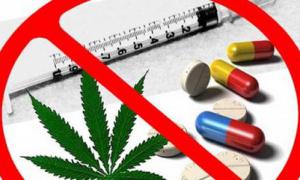 Cuba has been effective in preventing drug traffickers from operating within the country or using its territory as a transport route.
Cuba has been effective in preventing drug traffickers from operating within the country or using its territory as a transport route.
Cuba will never be used as a route for the transportation of illicit drugs, and much less will drug traffickers be able to establish themselves here, said Colonel Juan Carlos Poey, head of anti-drug efforts at the Ministry of the Interior (Minint).
Our forces will never allow Cuban territory to be used to transport or store narcotics, Poey said on the Roundtable television program, broadcast April 26.
He emphasized that the principal task of Minint personnel is to prevent drugs from impacting the foundations of society, that internal criminal organizations emerge, or international traffickers establish themselves within the country.
Poey reported that illegal drugs which have been confiscated include marijuana, psychotropics, and controlled medications, and to a lesser degree, cocaine, crack and hashish.
In 2015, he indicated, across the country a total of 1,266 kilos of drugs were confiscated, and 1,363 persons – 44 from abroad – were charged and convicted of violating drug laws, and sentenced in accordance with existing approved policies.
Thanks to the work of our anti-drug forces, a large volume of illegal substances did not reach drug dealers, and most importantly, were not consumed by our young people, he emphasized.
Also participating in the panel discussion was Dr. Alfredo González, deputy minister of Public Health, who explained that the use of illicit drugs brings dangerous consequences, including possible loss of consciousness, personality changes, and errant social behavior.
“Drugs constitute a threat to our society, so we must take appropriate action, with immediate measures to avoid the presence of this curse,” he said.
The doctor indicated that over-consumption of legal drugs like tea and coffee, as well as tobacco and alcohol, cause devastating diseases.
Also of concern, he noted, is the inappropriate use of prescription medication, including sedatives and narcotic pain relievers, which can cause death, especially if they are taken while consuming alcohol.
The country’s public health system focuses on the recovery of drug users, offering help to overcome addictions and be reintegrated into society, González said.
Also participating was Education Minister Ena Elsa Velázquez, who emphasized the school as the ideal place to strengthen young people’s ability to protect themselves and learn to avoid risks.
Our work is directed toward preventing drug consumption, and teaching students how to avoid situations which may lead to illegal drug use, she said, noting that schools do community work in collaboration with other institutions to provide young people engaging and healthy recreational activities, including sports and cultural events.
(Granma)